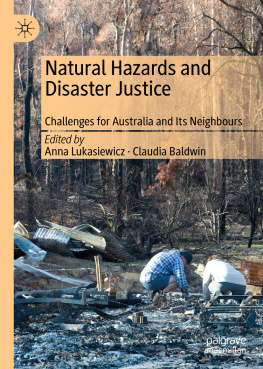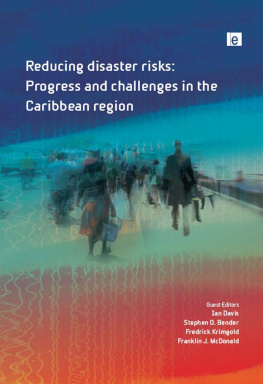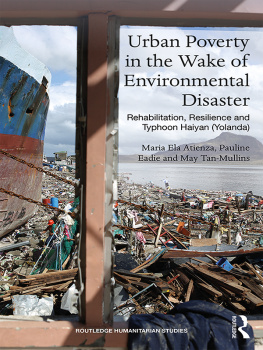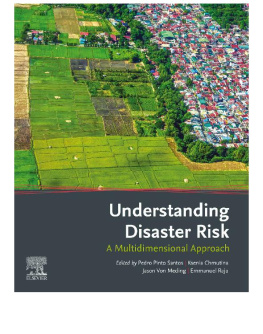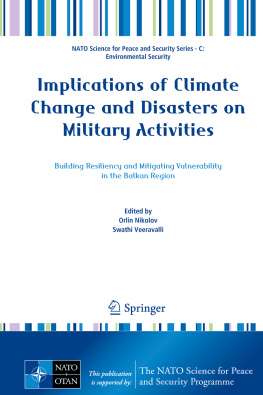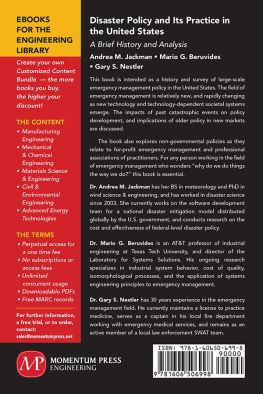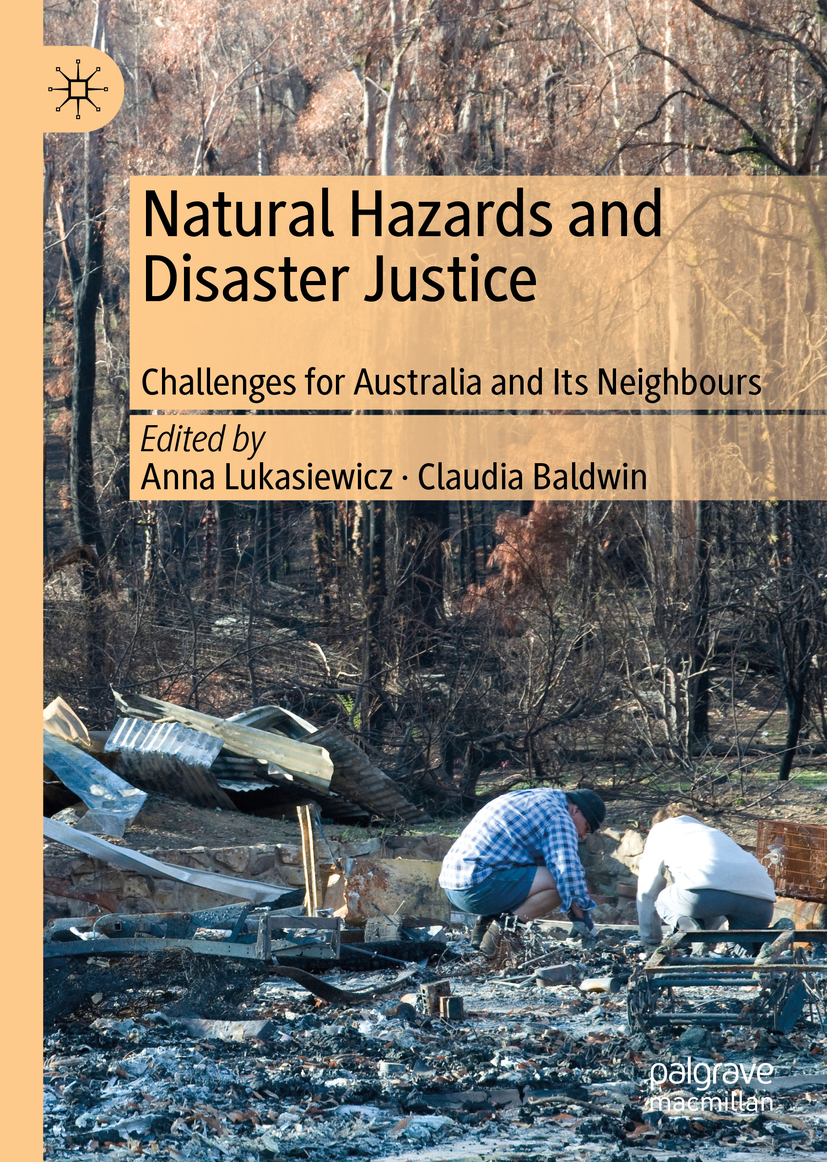Editors
Anna Lukasiewicz and Claudia Baldwin
Natural Hazards and Disaster Justice
Challenges for Australia and Its Neighbours
Editors
Anna Lukasiewicz
Fenner School of Environment and Society and Institute for Integrated Research on Disaster Risk Science, Australian National University, Canberra, ACT, Australia
Claudia Baldwin
Urban Design and Town Planning and Sustainability Research Centre, University of the Sunshine Coast, Maroochydore, QLD, Australia
ISBN 978-981-15-0465-5 e-ISBN 978-981-15-0466-2
https://doi.org/10.1007/978-981-15-0466-2
The Editor(s) (if applicable) and The Author(s), under exclusive license to Springer Nature Singapore Pte Ltd. 2020
This work is subject to copyright. All rights are solely and exclusively licensed by the Publisher, whether the whole or part of the material is concerned, specifically the rights of translation, reprinting, reuse of illustrations, recitation, broadcasting, reproduction on microfilms or in any other physical way, and transmission or information storage and retrieval, electronic adaptation, computer software, or by similar or dissimilar methodology now known or hereafter developed.
The use of general descriptive names, registered names, trademarks, service marks, etc. in this publication does not imply, even in the absence of a specific statement, that such names are exempt from the relevant protective laws and regulations and therefore free for general use.
The publisher, the authors and the editors are safe to assume that the advice and information in this book are believed to be true and accurate at the date of publication. Neither the publisher nor the authors or the editors give a warranty, expressed or implied, with respect to the material contained herein or for any errors or omissions that may have been made. The publisher remains neutral with regard to jurisdictional claims in published maps and institutional affiliations.
Cover illustration: Jennifer Hart / Alamy Stock Photo
This Palgrave Macmillan imprint is published by the registered company Springer Nature Singapore Pte Ltd.
The registered company address is: 152 Beach Road, #21-01/04 Gateway East, Singapore 189721, Singapore
Natural Hazards and Disaster Justice is a timely and notable contribution to an immensely significant and generally neglected area of research. The neglect is surprising given that Injustice features so prominently in disaster preparedness, prevention, response and recovery, with huge social, economic and political consequences. This important book not only usefully describes many of the theoretical underpinnings of these consequences, but also incorporates studies from within Australia and the Indo-Pacific region to illustrate how they play out in practice. Its cogent conclusions are particularly relevant in the era of climate change, which is greatly increasing the frequency and severity of hazards and, as a consequence, amplifying disaster injustice.
Robert Glasser, Visiting Fellow,Australian Strategic Policy Institute, and former United Nations Special Representative of the Secretary General for Disaster Risk Reduction
I congratulate the editors and contributing authors for a comprehensive, insightful, diverse and provocative book. In an age of unprecedented opportunity to shape our future whilst at the same time creating unprecedented risks that threaten to destroy our existence, disaster justice must play a key role in striking the balance for a safer, prosperous, equitable and sustainable world. This book represents some of the most dynamic thinking in the relationship between disaster justice and resilience, risk reduction and climate. It provides great appeal for all public and private policy makers, strategists and tacticians to escalate disaster justice as a central ethical consideration. It is a must read for everyone.
Mark Crossweller, Former Director General,Emergency Management Australia, and Head of the National Resilience Taskforce
Preface
With the occurrence, cost and human impacts of disasters increasing in Australia and worldwide, attention inevitably focuses on who bears the burden and impacts of these events. Media , political debates and numerous post-event inquiries (142 in Australia between 2009 and 2017) have exposed a multitude of issues around fairness and equity .
Under the broad policy settings of the Sendai Framework and Australias National Disaster Resilience Strategy, addressing the area of natural disasters has shifted from a prepare and respond approach to one that extends across the Preparation-Prevention-Response-Recovery (PPRR) spectrum, involves shared responsibilities and is more whole-of-society and whole-of-government.
Disaster events reveal, magnify and deepen existing injustices and can create future inequalities which lead to further injustice . Disaster justice focuses on these revealed inequities, whether they be spatially, socio-economically or politically created, seeking to better understand the uneven vulnerabilities and the policy and management options that can address them.
Disaster justice is a new and fluid area of research, drawing on multiple disciplines such as social justice , law, human geography, land use planning and social psychology. Areas such as participatory governance can provide insight into procedural justice issues (e.g. involvement in planning) that may later influence distributive justice (i.e. who gets resources or who is impacted), the latter topic further enriched by understanding of resource allocation, economics, law and social services. Disaster justice can provide fresh and useful insights into questions such as:
Are responsibilities for disaster prevention , preparation, response and recovery as fairly distributed across society as they can be?
In what ways are we proactive and successful in addressing both geographic and social vulnerabilities ?
How do pre-existing inequities impact on individual or community capacity to engage in aspects of disaster prevention , preparation, response and recovery ?
Do we share knowledge and opportunities for influencing disaster policy and emergency management in a just manner?
Are existing policy and management approaches capable of delivering just processes and outcomes and of doing so in a way that the Australian public would accept as appropriate in this emotionally and politically charged policy domain?
On 1920 November 2018, researchers from multiple Australian research institutions involved in disaster justice met in Canberra, Australia in preparation for writing this book. They discussed the meaning, importance and future of disaster justice research in Australia and its surrounds. While globally, disasters include earthquakes and terrorism, our contributors focused mainly on disasters that occur regularly in Australia, specifically floods , fires and storms . While this book focuses on natural hazards , there is nothing stopping others from applying disaster justice to man-made disasters. The book highlights issues discussed at that meeting of relevance to policy, practice and future research. It is divided into three parts: an introduction; a section on governance, including policy, planning, legal and economic approaches; and a third on vulnerability that reveals the implications of inequitable exposure to risk of disasters due to locational and social vulnerabilities but also suggestions for how to address this.

